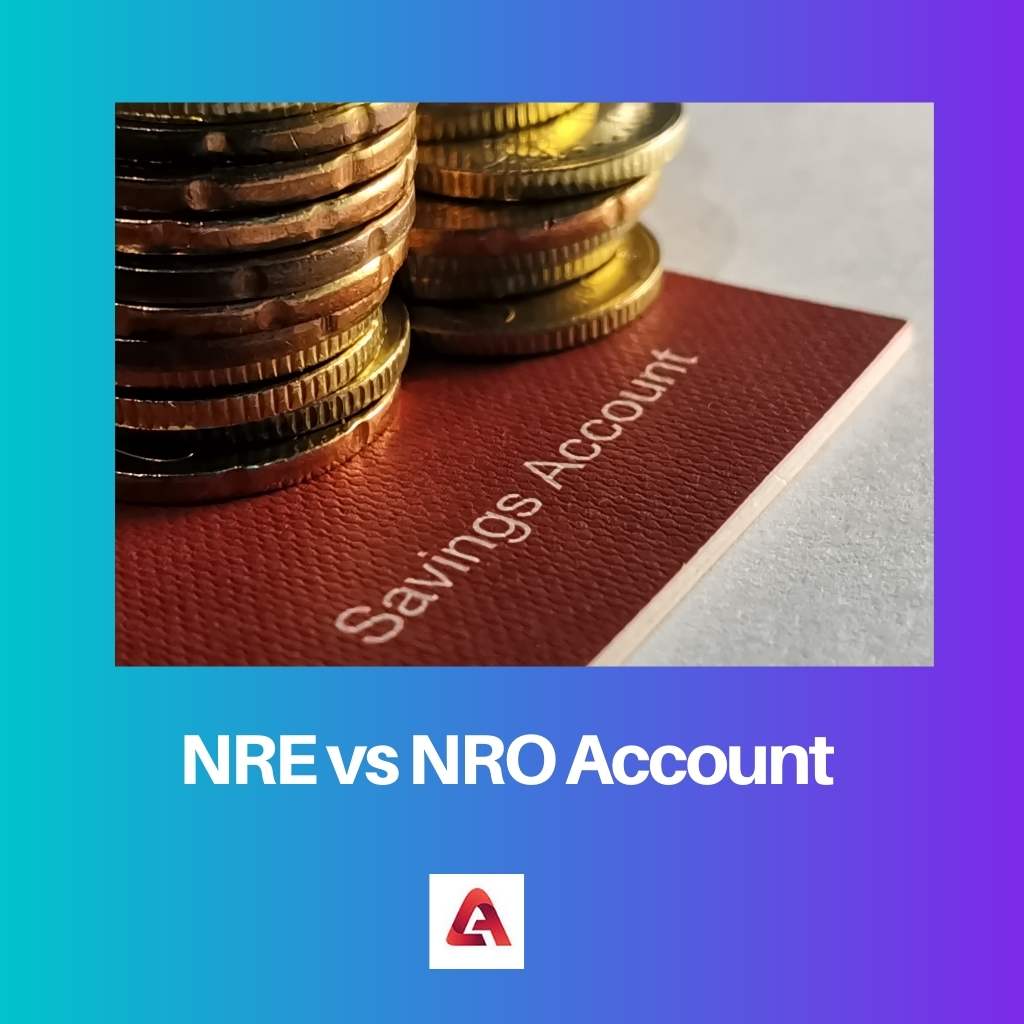NRE and NRO accounts are two types of accounts a person can take into consideration as an NRI (Non-Resident Indian).
The accounts are equally notable and convenient choices for an NRI to save and transfer money to India.
Even though both accounts can be opened by NRIs and have some similarities, they vary in many ways.
Key Takeaways
- NRE accounts hold a foreign currency that is earned outside India and can be freely repatriated, while NRO accounts hold Indian earnings and have restrictions on repatriation.
- NRE accounts are tax-free, while NRO accounts are subject to taxes.
- Non-resident Indians can only open NRE accounts, while non-resident Indians and resident Indians can open NRO accounts.
NRE vs NRO Account
NRE stands for Non-Resident External Account. An NRE account is a savings or current account held by NRIs in India, denominated in Indian Rupees (INR). NRO stands for Non-Resident Ordinary Account. An NRO account is also a savings or current account held by NRIs in India, denominated in Indian Rupees (INR).

The NRE (Non-Resident External) Account is an account that allows an NRI to transfer foreign funds or earnings to India in an Indian denomination. The money deposited in this account gets converted immediately into rupee currency once deposited.
This account provides conversion facilities allowing deposits in any currency to be converted into Indian rupees. Deposits in NRE accounts are freely repatriable and are also tax-free.
The NRO (Non-Resident Ordinary) Account is an account that allows an NRI to park or manage the income they earn in India in the Indian denomination. The earnings can be in the form of rental income, pensions, and dividends.
Additionally, the NRO account does allow the withdrawal of money in Indian currency from the account. However, unlike an NRE account, the NRO account does not allow the transferability of funds without restrictions.
Having an account like this is ideal for an NRI having income sources in India.
Comparison Table
| Parameters of Comparison | NRE Account | NRO Account |
|---|---|---|
| Acronym | Stands for Non-Residential External Account. | Stands for Non-Residential Ordinary Account. |
| Definition | Allows an NRI to transfer foreign funds or earnings to India in Indian rupees. | Allows an NRI to park or manage the income they earn in India in Indian rupees. |
| Earnings | For saving overseas earnings. | For saving earnings made in India. |
| Tax | Tax-free. Thus, interest and the principal amount earned are not subject to any taxation. | Interest earned from this account is subject to TDS (Tax Deductible at Source) |
| Repatriability | Is repatriable. | The interest and principal amount are repatriable only within the set limits. |
| Fund Transfer | Funds can be transferred to an NRO account. | Does not allow the transfer of funds to an NRE account. |
| Exchange Rate Risk | There is a significant Exchange rate risk in this account. | Not prone to Exchange rate risk. |
What is NRE Account?
An NRE (Non-Resident External) Account is a type of account that allows an NRI to transfer foreign funds or earnings to India in an Indian denomination.
The money deposited in this account gets converted immediately into rupee currency once deposited. The account can be in the form of a savings account, a Recurring or Fixed deposit.
The principal amount and interest earned from this account are tax-free. The NRE account also allows depositors to repatriate their deposits to any country. However, there is a significant Exchange rate risk in an NRE account.
Additionally, the transferability of money is almost without restrictions for an NRE account.
With an NRE account, it is possible to transfer funds to an NRO account as well as an NRE account. It provides currency conversion services that allow deposits in any currency to be converted into Indian rupees.
Two NRIs together can open a joint NRE account.

What is NRO Account?
The NRO (Non-Resident Ordinary) Account is an account that allows an NRI to park or manage the income they earn in India in the Indian denomination. The earnings can be in the form of rental income, pensions, and dividends.
However, in this account amount only be withdrawn if it is in Indian currency.
The principal amount and interest earned from this account are subject to TDS (Tax Deductible at Source). Additionally, the account does not allow free repairability. The interest and principal amount are repatriable only within the set limits.
Unlike an NRE account, the NRO account does not permit the transferability of funds without restrictions.
With an NRO account, it is not possible to transfer funds to an NRE account. It only accepts transfers to an NRO account. The Exchange Rate Risk for this account, however, is without any risk.
Having an account like this is ideal for an NRI having income sources in India.

Main Differences Between NRE and NRO Account
- An NRE (Non-Resident External) Account is a type of account that allows an NRI to transfer foreign funds or earnings to India in an Indian denomination. On the other hand, The NRO (Non-Resident Ordinary) Account is an account that allows an NRI to park or manage the income they earn in India in the Indian denomination.
- The NRE account is significant for overseas earnings, whereas the NRO account is significant for earnings in India.
- NRE earned interest, and the principal amount is tax-free, whereas interest earned in an NRO account is subject to TDS (Tax Disposability at Source)
- NRE permits the free repairability of funds, whereas NRO does not. NRO only allows chargeable repairability.
- With an NRE account, it is possible to transfer funds to an NRO account as well as an NRE account, whereas, with an NRO account, it is not possible to transfer funds to an NRE account. It only accepts transfers to an NRO account.

References
- https://papers.ssrn.com/sol3/papers.cfm?abstract_id=2119769
- http://management.nrjp.co.in/index.php/JBMFS/article/view/481
Last Updated : 17 August, 2023

Chara Yadav holds MBA in Finance. Her goal is to simplify finance-related topics. She has worked in finance for about 25 years. She has held multiple finance and banking classes for business schools and communities. Read more at her bio page.

The detailed comparison provided in this article clarifies the important differences between NRE and NRO accounts. It’s very illuminating.
This article breaks down the complexities of NRE and NRO accounts in a comprehensive way. The information is invaluable for NRIs.
The detailed explanations and comparison table provided in this article make it an excellent resource for anyone looking to understand NRE and NRO accounts.
This article provides insightful information that helps clarify the differences between NRE and NRO accounts, making it an invaluable resource.
The article offers a comprehensive examination of NRE and NRO accounts, making it an educational and enlightening read for NRIs.
The article offers an in-depth analysis and comparison of NRE and NRO accounts, making it highly informative and valuable for NRIs.
I found the comparison table to be incredibly useful for understanding the nuances between NRE and NRO accounts. It’s a great resource.
This article provides a clear and comprehensive comparison between NRE and NRO accounts. The explanation is very helpful.
I found the comparison table incredibly informative. It made it easier to grasp the key differences between NRE and NRO accounts.
The comparison table was particularly useful. It’s a great reference for understanding the distinctions between NRE and NRO accounts.
The article does an excellent job of explaining the differences between NRE and NRO accounts. There’s a lot of valuable information provided on the topic.
I agree, the comprehensive explanation was very informative and useful. I would recommend this article to anyone interested in NRE and NRO accounts.
The information in this article is valuable, and the differences between NRE and NRO accounts are explained thoroughly.
The article delivers a detailed comparison and analysis of NRE and NRO accounts, making it an indispensable resource for NRIs seeking clarity on the topic.
The comprehensive explanation of NRE and NRO accounts in this article offers valuable insights and information for NRIs.
The thorough comparison of NRE and NRO accounts offered in this article makes it an excellent source of information for NRIs.
The detailed comparison table provides a clear overview of the disparities between NRE and NRO accounts, making it a highly informative article.
This article presents a comprehensive analysis of NRE and NRO accounts, offering valuable information for NRIs seeking clarity on these accounts.
The article provides a comprehensive overview of NRE and NRO accounts, making it an enlightening and valuable resource for NRIs.
The information provided in this article is highly informative, offering valuable insights into the key differences between NRE and NRO accounts.
The detailed breakdown of NRE and NRO accounts in this article makes it an essential read for anyone seeking to understand the distinctions between them.
The information provided in this article offers valuable insights into the differences between NRE and NRO accounts, making it a must-read for NRIs.
The article is a valuable resource for understanding the complexities and differences between NRE and NRO accounts, providing a comprehensive explanation.